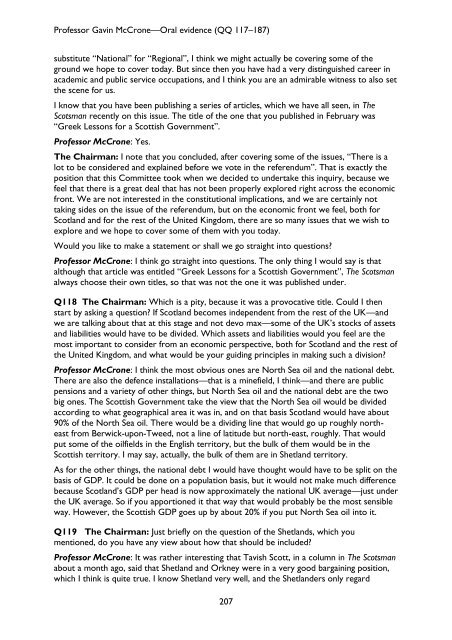SELECT COMMITTEE ON ECONOMIC AFFAIRS - Parliament
SELECT COMMITTEE ON ECONOMIC AFFAIRS - Parliament
SELECT COMMITTEE ON ECONOMIC AFFAIRS - Parliament
Create successful ePaper yourself
Turn your PDF publications into a flip-book with our unique Google optimized e-Paper software.
Professor Gavin McCrone—Oral evidence (QQ 117–187)<br />
substitute “National” for “Regional”, I think we might actually be covering some of the<br />
ground we hope to cover today. But since then you have had a very distinguished career in<br />
academic and public service occupations, and I think you are an admirable witness to also set<br />
the scene for us.<br />
I know that you have been publishing a series of articles, which we have all seen, in The<br />
Scotsman recently on this issue. The title of the one that you published in February was<br />
“Greek Lessons for a Scottish Government”.<br />
Professor McCrone: Yes.<br />
The Chairman: I note that you concluded, after covering some of the issues, “There is a<br />
lot to be considered and explained before we vote in the referendum”. That is exactly the<br />
position that this Committee took when we decided to undertake this inquiry, because we<br />
feel that there is a great deal that has not been properly explored right across the economic<br />
front. We are not interested in the constitutional implications, and we are certainly not<br />
taking sides on the issue of the referendum, but on the economic front we feel, both for<br />
Scotland and for the rest of the United Kingdom, there are so many issues that we wish to<br />
explore and we hope to cover some of them with you today.<br />
Would you like to make a statement or shall we go straight into questions?<br />
Professor McCrone: I think go straight into questions. The only thing I would say is that<br />
although that article was entitled “Greek Lessons for a Scottish Government”, The Scotsman<br />
always choose their own titles, so that was not the one it was published under.<br />
Q118 The Chairman: Which is a pity, because it was a provocative title. Could I then<br />
start by asking a question? If Scotland becomes independent from the rest of the UK—and<br />
we are talking about that at this stage and not devo max—some of the UK’s stocks of assets<br />
and liabilities would have to be divided. Which assets and liabilities would you feel are the<br />
most important to consider from an economic perspective, both for Scotland and the rest of<br />
the United Kingdom, and what would be your guiding principles in making such a division?<br />
Professor McCrone: I think the most obvious ones are North Sea oil and the national debt.<br />
There are also the defence installations—that is a minefield, I think—and there are public<br />
pensions and a variety of other things, but North Sea oil and the national debt are the two<br />
big ones. The Scottish Government take the view that the North Sea oil would be divided<br />
according to what geographical area it was in, and on that basis Scotland would have about<br />
90% of the North Sea oil. There would be a dividing line that would go up roughly northeast<br />
from Berwick-upon-Tweed, not a line of latitude but north-east, roughly. That would<br />
put some of the oilfields in the English territory, but the bulk of them would be in the<br />
Scottish territory. I may say, actually, the bulk of them are in Shetland territory.<br />
As for the other things, the national debt I would have thought would have to be split on the<br />
basis of GDP. It could be done on a population basis, but it would not make much difference<br />
because Scotland’s GDP per head is now approximately the national UK average—just under<br />
the UK average. So if you apportioned it that way that would probably be the most sensible<br />
way. However, the Scottish GDP goes up by about 20% if you put North Sea oil into it.<br />
Q119 The Chairman: Just briefly on the question of the Shetlands, which you<br />
mentioned, do you have any view about how that should be included?<br />
Professor McCrone: It was rather interesting that Tavish Scott, in a column in The Scotsman<br />
about a month ago, said that Shetland and Orkney were in a very good bargaining position,<br />
which I think is quite true. I know Shetland very well, and the Shetlanders only regard<br />
207

















